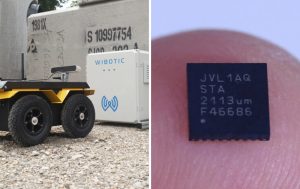Adapted from UW News

According to a new report from The Science Coalition, the University of Washington is the No. 4 higher education institution in the country in terms of total economic impact as a result of federal research expenditures. UW ECE-affiliated companies WiBotic and Jeeva Wireless were featured in the report.
According to a new report from The Science Coalition, a group of more than 50 of the nation’s leading public and private universities, the University of Washington is the No. 4 higher education institution in the country in terms of total economic impact as a result of federal research expenditures. UW ECE-affiliated companies WiBotic and Jeeva Wireless, which grew out of federally funded university research and got their start in the lab of UW ECE professor Joshua Smith, were featured in the report as contributing to this high national ranking.
The report details the economic impact of spinoff companies created from federally funded university research and highlights 53 spinoff companies from coalition member institutions. The report states that the UW alone contributed $306.8 million to the U.S. gross domestic product and helped to produce more than 3,908 jobs. It also notes that Wibotic and Jeeva Wireless ultimately contributed $30.9 million to the U.S. GDP and 28 jobs. Overall, the report found that federally funded university research supported nearly 100,000 jobs and contributed more than $1.3 billion to the U.S. GDP across all 50 states between 2015 and 2019.
WiBotic and Jeeva Wireless

At left, a mobile robot approaches a WiBotic wireless charging station on a construction site. Right, the Jeeva Wireless Parsair chip.
WiBotic provides wireless power optimization solutions that are integral to charging the rapidly growing ecosystem of aerial, mobile, marine and industrial robots. The company is currently working with NASA to develop a line of lightweight, ultrafast wireless chargers that could help both humans and robots live and work on the moon.
The Jeeva Wireless Parsair chip provides ultra-low power communication technology and creates passive backscatter technology that uses 1,000 times less power, costs significantly less, and takes up less space than conventional radios, allowing devices to communicate over standard wireless protocols. In addition to funding the fundamental research, the first investment into Jeeva Wireless was from the National Science Foundation’s Small Business Innovation Research program.

Joshua Smith is the Milton and Delia Zeutschel Professor in Entrepreneurial Excellence at UW ECE and in the Paul G. Allen School of Computer Science & Engineering. He is also co-founder of UW spinoffs WiBotic and Jeeva Wireless. Smith noted in The Science Coalition report the important role federal research funding played in development of both of these UW ECE-affiliated companies. Photo by Tara Gimmer
The importance of federal funding for research
Smith, who is the Milton and Delia Zeutschel Professor in Entrepreneurial Excellence at UW ECE and the Paul G. Allen School of Computer Science & Engineering, is also co-founder of WiBotic and Jeeva Wireless. He was quoted in the report as saying that the federal funding received in 2011 was “essential to launching Jeeva.” According to Smith, “Several years of fundamental research, which led to numerous awards and patents, created the fundamental technology,” which includes a battery-free power source. “Then further grants and contracts from the government have allowed the company to take the technology further, turning it into a real business, creating new jobs,” he said.
The report ranks coalition member institutions based on economic impact as a result of federal expenditures. It’s on this list that the UW ranks fourth behind Johns Hopkins University, University of Michigan and University of California, San Francisco.
To learn more, view this UW press release and The Science Coalition’s fourth Sparking Economic Growth report, released in April 2021.

